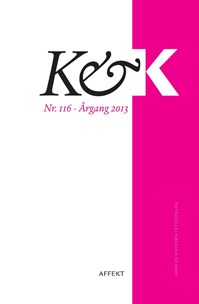LIDENSKAB FOR KROP OG SJÆL - CORNEILLES LE CID (1637) I FØLELSESHISTORISK BELYSNING
DOI:
https://doi.org/10.7146/kok.v41i116.15889Nøgleord:
Pierre Corneille, Le Cid, passion, Descartes, dramatic rulesResumé
PASSION FOR BODY AND SOUL | The article engages with the history of emotions by analyzing Pierre Corneille’s pivotal play Le Cid (1637) and the ”querelle” it gendered from the point of view of 17th century affect theory. Corneille’s play has often been seen as an affirmative culmination of the aristocratic ideal of glory-seeking, but the article argues that the aristocratic ethos and its passions are circumscribed by a mechanistic understanding of human passion which focuses on the body as the locus of human passion. Similarly, discussions among the theoreticians and practitionersof early classicist drama of theatre’s obligations to educate the passions − a crucial topic in the ”querelle du Cid” − are more concerned with the regulation of mechanical passion than with the mere production of aristocratic ideology. Le Cid is therefore not just a retrograde celebration of chivalric gloire but an exploration of emergent modern forms of affective regulation.
Downloads
Citation/Eksport
Dahl, C. (2013). LIDENSKAB FOR KROP OG SJÆL - CORNEILLES LE CID (1637) I FØLELSESHISTORISK BELYSNING. K&K - Kultur Og Klasse, 41(116), 49–61. https://doi.org/10.7146/kok.v41i116.15889
Nummer
Sektion
Artikler
Licens
Tidsskriftet følger dansk ophavsret.





